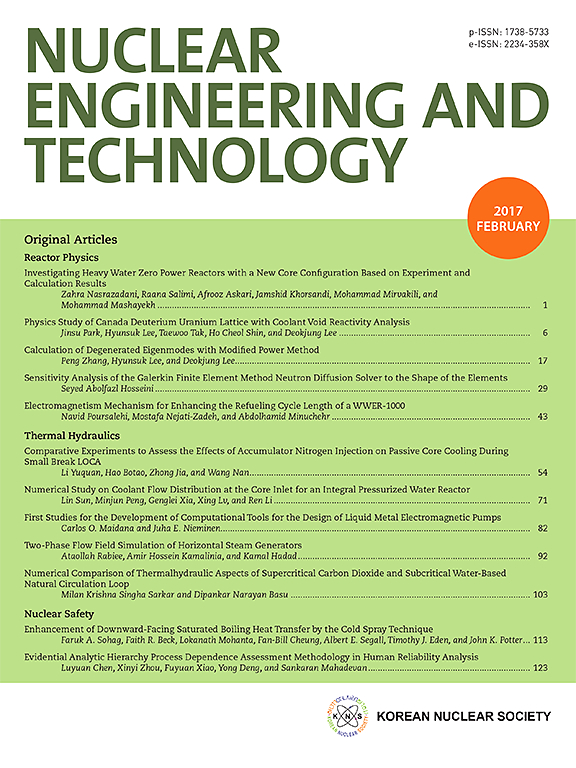板式压水堆堆芯新型精细网格中子/热液压耦合基准的装配设计和建模分析
IF 2.6
3区 工程技术
Q1 NUCLEAR SCIENCE & TECHNOLOGY
引用次数: 0
摘要
为支持高参数(功率与质量流量比大于 235 kW/kg,堆芯出口焓大于 1500 kJ/kg)板式压水堆中子/热工耦合计算方法或仿真代码的精细网格验证,中国核动力研究院设计了一套基于高参数的板式压水堆耦合计算(COPHP)。包括清华大学、西安交通大学和华中科技大学在内的多个行业研究团队参与了 COPHP 基准的制作。本文对已完成的组件设计和建模计算进行了详细说明,并提供了使用 RMC、OpenMC 和 KYLIN V2 软件对 6 个组件的 10 种工况计算出的、细网格相对功率分布和偏差结果。结果显示1) 在使用相同截面库的情况下,OpenMC 计算结果与 RMC 结果一致。以ENDF/B-VII.1为例,所有组件在整个燃烧过程中的最大偏差为-157pcm,相对功率的最大偏差为-1.13 %,最大功率权重误差(PWE)为 0.226 %。2) 使用ENDF/B-VII.1对KYLIN V2和RMC进行比较,在计算全部控制棒退出(ARO)条件下的标准组件和两个可燃毒物组件时,最大偏差为-468pcm,最大相对功率偏差为-1.49 %,最大功率权重误差(PWE)为0.316 %。在计算全部控制棒插入(ARI)条件下的标准组件时,最大偏差为 -795pcm,最大相对功率偏差为 1.81 %,最大 PWE 为 0.369 %。本文章由计算机程序翻译,如有差异,请以英文原文为准。
Assemblies design and modeling analysis of a new fine mesh neutronics/thermal-hydraulics coupling benchmark for plate-type PWR core
In order to support the verification of neutronics/thermal-hydraulics coupling calculation method or simulation codes at the fine mesh for plate-type pressurized water reactor (PWR) with high parameters (which the ratio of power to mass flow rate is greater than 235 kW/kg, the core outlet enthalpy exceeds 1500 kJ/kg), a set of coupling calculation of plate-type PWR based on high parameters (COPHP) is design by Nuclear Power Institute of China (NPIC). Multiple industry research teams, including Tsinghua University, Xi'an Jiaotong University, and Huazhong University of Science and Technology, participated in the production of COPHP benchmark. This article provides a detailed explanation of the completed assembly design and modeling calculations, and provides the keff, pin-by-pin wise fine mesh relative power distribution, and deviation results calculated for 10 conditions of 6 assemblies using RMC, OpenMC, and KYLIN V2 software. The results show that: 1) when using the same cross-sectional library, the OpenMC calculation results are in good agreement with the RMC results. Taking ENDF/B-VII.1 as an example, the maximum deviation of keff in the entire burnup process of all assemblies is −157pcm, the maximum deviation of relative power is −1.13 %, and the maximum power weight error(PWE) is 0.226 %. 2) Compared between KYLIN V2 and the RMC by using ENDF/B-VII.1, the maximum deviation of keff is −468pcm, the maximum deviation of relative power is −1.49 %, and the maximum PWE is 0.316 % when calculating the standard assemblies with all control rod out(ARO) condition and two burnable poison assemblies. The maximum deviation of keff is −795pcm, the maximum deviation of relative power is 1.81 %, and the maximum PWE is 0.369 % when calculating the standard assemblies with all control rod inserted(ARI) conditions.
求助全文
通过发布文献求助,成功后即可免费获取论文全文。
去求助
来源期刊

Nuclear Engineering and Technology
工程技术-核科学技术
CiteScore
4.80
自引率
7.40%
发文量
431
审稿时长
3.5 months
期刊介绍:
Nuclear Engineering and Technology (NET), an international journal of the Korean Nuclear Society (KNS), publishes peer-reviewed papers on original research, ideas and developments in all areas of the field of nuclear science and technology. NET bimonthly publishes original articles, reviews, and technical notes. The journal is listed in the Science Citation Index Expanded (SCIE) of Thomson Reuters.
NET covers all fields for peaceful utilization of nuclear energy and radiation as follows:
1) Reactor Physics
2) Thermal Hydraulics
3) Nuclear Safety
4) Nuclear I&C
5) Nuclear Physics, Fusion, and Laser Technology
6) Nuclear Fuel Cycle and Radioactive Waste Management
7) Nuclear Fuel and Reactor Materials
8) Radiation Application
9) Radiation Protection
10) Nuclear Structural Analysis and Plant Management & Maintenance
11) Nuclear Policy, Economics, and Human Resource Development
 求助内容:
求助内容: 应助结果提醒方式:
应助结果提醒方式:


